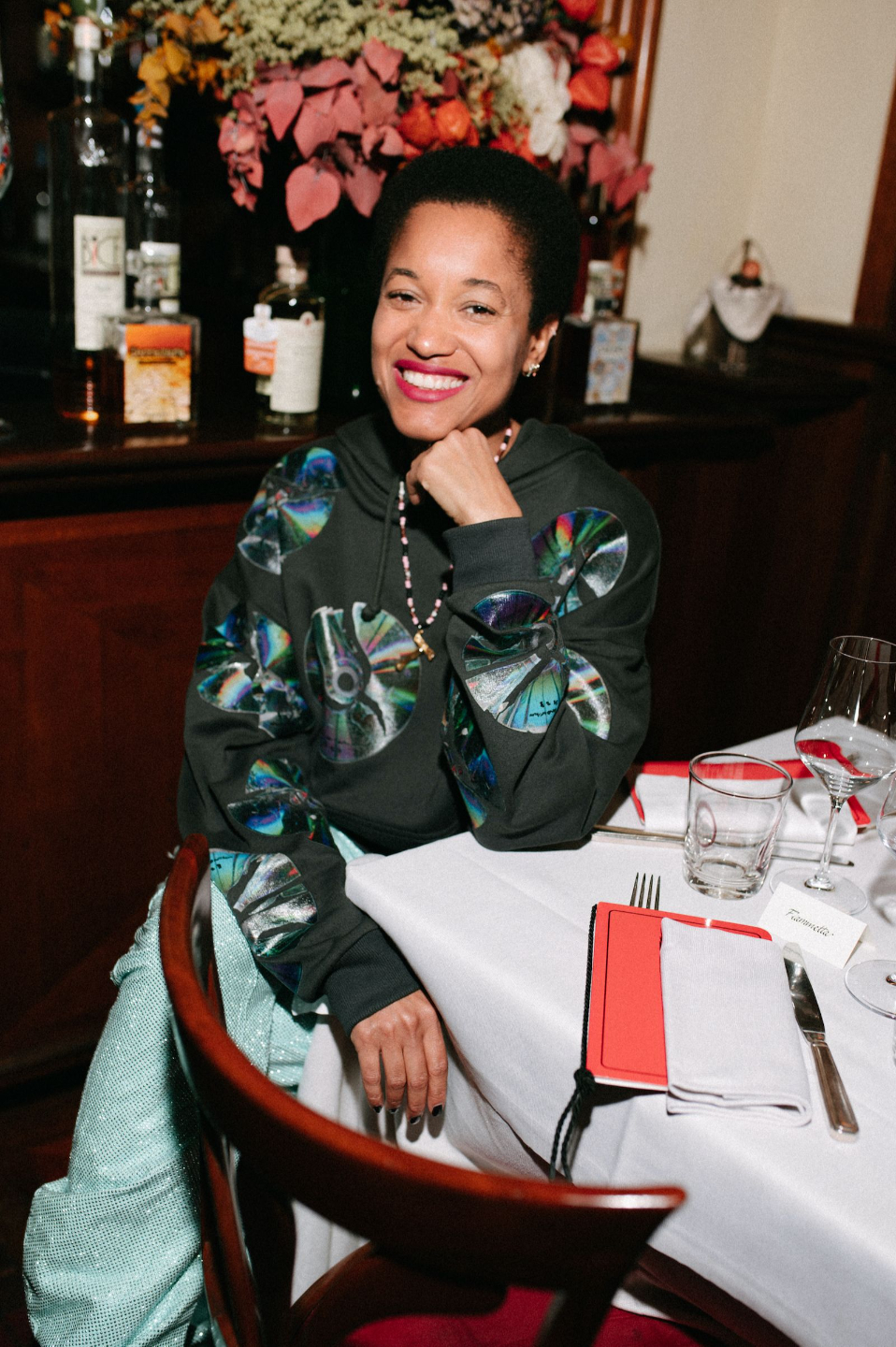During the Christmas holidays, I saw a post on Instagram that embraced leaning into mediocrity. This sentiment left me feeling sad, because no matter how difficult the state of my professional life, I always make a point to check in with my love for fashion and my passion for creativity in order to make peace with my perceived personal failures and business-related slights of all flavors. Before I go on, I wholly admit that as an independent digital creative, I enjoy more professional freedom than those who work within companies and organizations. I am my own boss, and I am responsible for the performance of my projects and partnerships. However, I also naturally feel frustrated when my peers are rewarded more for work that is of the same or a lower quality than I produce. Plus, in a world where comparison culture is intensified by the vast reach of social media, it is difficult to not succumb to the pressure of what feels like an infinite scroll of highlight reels. How can we feel satisfied with our personal accomplishments (minute or immense) when our colleagues and friends are scaling Mount Everest, day after day, post after post? In spite of their seemingly consistent Herculean feats, are the rest of us truly mediocre? Do we have to really lean into a journey of solely skimming the brim of our potential because of unbalanced work environments, or the notion that the climb to excellence or exceptionalism is too grueling and insurmountable? Are we not interested in the lessons, the joy or the purpose we might find along the way?
To answer some of these questions and understand why good hardworking folks are opting for a future of mediocrity, I asked my friends what they thought of the topic. What I took away from my conversations is that there exist many scenarios where people believe that they are mediocre or choosing mediocrity, but what they are really doing is managing their particular circumstances and often their coping mechanisms do not fully demote their productivity to a level of mediocrity. In effect, there is a tendency to conflate efforts to confront the unfavorable circumstances surrounding the bread and butter of our actual work or productivity with opting for or being mediocre.
Motivation
One friend who works as a creative shared that in her case it comes down to a lack of personal motivation. She confessed that she felt less motivated than an ambitious colleague who is setting his business up for success by creating impressive promotional and marketing tools, while she hasn’t focused much effort on this aspect of her work. She described the complicated feelings that she experiences because she isn’t checking off any items from the long list of things you need to accomplish to get yourself noticed in her industry. She concluded that since she wasn’t organizing her business like he was, she was proving to be mediocre. In contrast to her assessment of herself, during our numerous conversations about work, she’s always crystal clear about refining her aesthetic, being selective and focusing on her client list, saying no to requests that will limit her production time, and intentionally avoiding any influence which may contaminate her creative lens. A truly talented artist, she is far from mediocre, and is actually steadily building a name for herself. She is motivated by the more creative line of her craft and is consistent in fulfilling her objectives. Hers is a perfect example of how comparison culture can make you feel less than if you’re not “showing up” like your peers, as well as cause you to lose sight of what moves you and the many successes you achieve during the course of your journey.
If you are feeling unmotivated, please remember that we all experience moments of funk and stagnation at some point in our lives. Start by asking yourself what about your situation has caused your enthusiasm to wane. Is it the subject of your work or activity? Is it your work environment? Then look at what you can change. If you do need to switch things up, take as much time as you need to consider what grabs your attention, fills you with joy and sustains your enthusiasm professionally and personally. Surround yourself with people who positively motivate you to fulfill your personal goals. And remember that you will not always be enamored with your career or your hobby, but that certainly doesn’t make you mediocre.
Work-Life Balance
More than one friend pointed to the pursuit of work-life balance when I brought up the topic of mediocrity. In past generations, employees worked backbreaking hours to rise to the top of their companies, secure generous compensation and to ultimately fulfill society’s definition of what makes a valuable team member. More than often the hours spent within the halls or on the floor of enterprise was at the expense of family, friends, physical health and sanity. A shift in priorities, sparked by millennials who recognized the value of their time outside of work, has created a reality where long hours as a means to success no longer pave a yellow brick road. This movement in workforce culture has positively influenced companies to elevate the well-being and engagement of their employees as a prong of corporate social responsibility. While there are so many positive angles to work-life balance, the approach is vulnerable to criticism from reluctant members of previous generations who believe that working less can lead to mediocre results. Some work life balance proponents rebut this line of thinking with the idea that many employees are now learning to work less, but smarter. Still, there is a strong argument that a segment of the work-life balancers, who over-prioritize their personal lives or change jobs frequently because they refuse to compromise their requirements for the ideal work environment will eventually only possess the skills to produce mediocre or substandard work because of their lack of dedication and failure to acquire adequate skill and expertise.

Multitasking
A friend of mine who is a leading breast oncologist and mother of two here in Milan suggested that one of the reasons people were embracing mediocrity is a result of the fact that the distracting nature of multitasking has caused our productivity to suffer as a whole. Like long work hours, multitasking became a badge of honor in work culture based on the idea that the more tasks you can complete within the same time frame, the bigger an asset you are to the business. The topic also applies to personal life as we all have been guilty of multitasking at home, and during leisure time with friends or romantic partners. However, studies have shown that juggling multiple tasks can actually be counterproductive, unhealthy for your brain, and cause burnout. Since the difficulty of satisfactorily executing numerous projects contemporaneously is significant, we are then resigned to feelings of mediocrity when the results are lukewarm across the board. This situation is yet another negative impact of hustle culture. We all want to be valuable players in the game. We all want to show up. We take on more responsibilities than we can chew on and we struggle to be fully present while completing them. Then we erroneously blame ourselves for not slaying the tasks. In this case, it’s like we aren’t setting ourselves up to truly thrive and are essentially being swept along by something of an against all odds current. As a remedy to the emotional and physical toll caused by multitasking, experts are moving towards the approach of monotasking, where we fully focus on one activity at a time. Hard working folk, before you write off your average project outcomes as proof of your being the perfect candidate for a life of mediocrity, why not return to a reality where you can pour all your thoughtfulness, talents, strengths and passions into your work again? I don’t think you belong in a state where you don’t see how awesome you are.
At the end of the day, we cannot control the external forces that challenge our achievements in our professional and personal lives. All of the discomfort, frustration, resentment and bitterness that we feel when our efforts are not seen and acknowledged, when we are passed up for opportunities, fail to hit the mark with our projects and responsibilities and fall short of connecting in the way we desire are valid. It is extremely difficult to rise out of that simmering sauce pan because our emotions and egos are under pressure. But these slights don’t mean that we are mediocre individuals, nor do we need to lean into that school of thought. We have all learned important lessons about ourselves since the start of the pandemic. We have reassessed our life goals and priorities. Let’s continue to take stock of our culture and unpack elements that limit our potential. What is perfection? What is excellence? What is success? What terms are worth compromising on to sustain ourselves respectfully into the future? How do these concepts pertain to us as individuals? Our journeys are unique paths that align with our cosmic existence. There are maps that serve as guides which make our lives in society more manageable, but which we should adapt for our happiness and sense of purpose.
If you have chosen mediocrity, you are an active player in your fate. You demonstrate great courage by intentionally selecting a strategy to address the unfairness in the world. However, you might be cutting your tail off by dimming your brilliance, and the rewards that you can create for yourself along your path. Choosing to preserve your physical health, sanity and the integrity of your work is a sign of self love, but isn’t pursuing something you have a talent for on your terms self care as well? For instance, during the scariest height of the pandemic here in Italy, I immersed myself in the process of my work and accessed a sparkly calm which helped me to manage my anxiety and make sense of what was happening around me. Since then I am able to access that feeling whenever I feel disillusioned by the fashion industry because of the inherent flaws in the system. In a small but extremely important way, I have identified what I love most about creating, and I sink my hand into that enthusiasm when I just want to throw a middle finger up in the air.
When do we start to re-center achieving for ourselves, by our standards? Are we unable to see the value of our wins if they aren't validated by others? I’m not saying that you are going to have moments like I did during the pandemic every day - I sure don’t. But what those moments do offer is clarity of how fulfilling your work and life experience can be. And maybe that visual is your prize, the one you keep your eye on in 2023 and beyond. Here’s to a life that is exceptionally yours.
Love and always love,
Tamu





